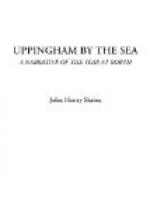If we came here at dinner-time, we should see the housemaster at the head of his table, and his wife or members of his family at the other end. The scene would be quite wanting in the picturesque, but no sense of comfort would make amends for it. For it is dark, especially in the centre of the corridor, and the carver of those vast joints never knows when he will strike his elbow against the walls or passers-by; while the incidence of draughts is clearly enough defined by here and there a coat-collar turned up in self-defence; for neither the glass front door, nor the wooden porch, nor our massive porter can effectually keep out the weather. Dinner here is a stern bit of the day’s work, to be discharged with a serious fortitude.
We have described how we eat, but said nothing yet of what was eaten. Yet our practical narrative cannot ignore the matter. Certain delicate subjects, however, are best treated dialectically, and perhaps we could not here do better than record a dialogue which we think we must have overheard between Grumbler and Cheerful, two dramatic characters not unknown to readers of the School Magazine some year ago:
Cheer. Have you read
that jolly letter in The Times, on
“Uppingham by the Sea?”
Grumb. Yes, I have;
and the writer says, “The commissariat was on
the whole good.” I must
say that surprises me.
Cheer. Why where was it at fault, then?
Grumb. Where?
It was at fault all round. Look at the
puddings—everlastingly
smoked!
Cheer. Yes; but the commissariat is not puddings.
Grumb. Well then, the
coals—all chips and small dust; at least,
when there were any.
Cheer. But the commissariat is not coals.
Grumb. Then the cold plates your gravy froze on!
Cheer. My good fellow, who ever heard of hot plates on a picnic?
Grumb. How about the
vegetables then, that never came to table
except to make believe there was
something in the Irish stew? or what
do you call the thing they sometimes
served out for butter?
Cheer. Ah! well! “a
rose by any other name”—you know the
rest. But
still, the commissariat isn’t
bad because the butter was so sometimes.




